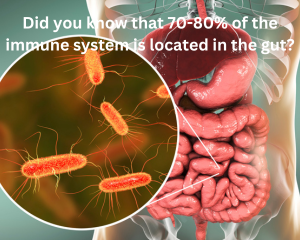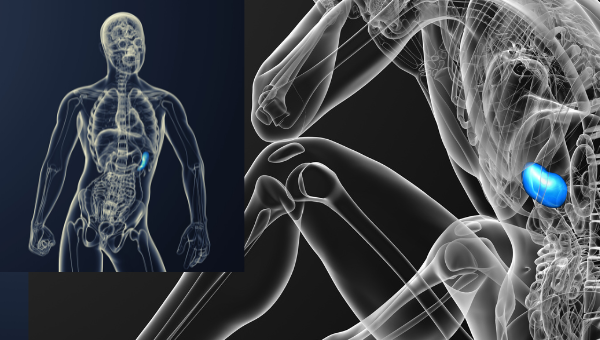Immune-Gut Connection
Did you know that a significant portion of the immune system is located in the gut? Approximately 70-80% of the body’s immune cells reside in the gut-associated lymphoid tissue (GALT). GALT includes structures like Peyer’s patches, isolated lymphoid follicles, the Appendix, and other lymphoid aggregates. This extensive network plays a critical role in defending the body against pathogens ingested with food, maintaining tolerance to beneficial microbes and dietary antigens, and regulating systemic immune responses.
What does this mean?
We’re glad you’re asking. Essentially the immune system’s job is to recognize what enters the body. What is this? Is it safe, whole, real? Does the body recognize it or not? Either way, the immune system will activate and initiate an immune response.

If unrecognizable, the immune response causes inflammation in the body, something we should try to minimize. Too much inflammation can be an initiator of many health complications. Some of them life long chronic health issues.
It is important to understand the processes in your body and how food choices can cause inflammatory responses. There are different factors that can evoke an inflammatory immune response. See below.
Dysbiosis
Dysbiosis: An imbalance of ‘good’ to ‘bad’ bacteria in the gut. Whereby, bad bacteria present is higher than good bacteria. To keep the ‘good’ guys in check, consumption of fermented foods are a good option to keep balance in the gut, along with limiting the consumption of junk food (processed, refined, trans fat, and sugary foods).
Leaky Gut
An overused term, but a very common diagnosis these days. With the world we live in today leaky gut is a frequent flyer for a lot of us. Leaky gut is just what it sounds like, the lining of the intestine becomes extremely permeable and allows the free flow of toxins back and forth causing inflammation. Managing your food choices is first and foremost for repairing the gut and the immune-gut connection.
Food
Surprise, surprise! What you eat directly reflects what happens inside your body. What your body uses and what your body stores. Whole foods rich in vitamins and minerals are recognized by the body. Processed and refined foods send our body systems into a frenzy. Our understanding of what happens when junk enters our bodies can make a huge difference in our health.
There’s no doubt about it that this is a process that takes time and patience.
Maintaining a healthy gut-immune connection involves several strategies that promote a balanced gut microbiome and overall gut health. Here are some key approaches:
High Fiber foods – Eat plenty of fruits, vegetables, whole grains, legumes, and nuts. These foods feed beneficial gut bacteria. You don’t eat these things? Try microdosing whole and fermented foods. This is a great way to start slowly changing your gut microbiota for the better and begin healing and balancing your immune-gut connection. You don’t need much, just start with some!
Probiotics – Consume fermented foods like yogurt, kefir, sauerkraut, kimchi, and miso, which contain live beneficial bacteria. Microdosing whole and fermented foods can increase good bacteria levels in your gut. Start small and work your way up.
Prebiotics – Eat prebiotic-rich foods like garlic, onions, leeks, asparagus, bananas, and chicory root, which nourish good bacteria.
Limit processed, fried and added sugar foods – High sugar and processed foods promote the growth of harmful bacteria and cause inflammation. DO NOT take fruit out of your diet. Fruit is whole food. It does not contain added sugar. It is naturally occuring. This is good for your body.

Balanced lifestyle
- Hydrate – Drink plenty of water to help with digestion and nutrient absorption.
- Regular exercise – Physical activity promotes a diverse and healthy gut microbiome.
- Sleep! A good night’s sleep supports overall health and a balanced immune system. Sleep is a healer!
- Manage Stress – Chronic stress can negatively affect gut health. Practice relaxation techniques like, putting down your devices, reading a book, breathing exercises, or taking part in an art class.
- Avoid unnecessary Antibiotics – Overuse of antibiotics can disrupt the balance of gut bacteria. Only use antibiotics if absolutely necessary!
- Avoid smoking and excessive alcohol use. Both smoking and alcohol use harm the gut lining and disrupt balance in gut bacteria.
- Maintain a healthy weight – Which shouldn’t be difficult if you follow the points above. Obesity is linked to a less diverse gut microbiome and increased inflammation.
- Get regular check-ups, and keep your colon clean – Regular health check-ups can help detect and manage any underlying conditions that might affect gut health, and keeping your colon clean helps you avoid over toxification.
The result of bad lifestyle choices can literally be deadly. It’s always your choice how you take care of your body. At Vitalife, we will guide you, but never force you to make better choices. Our Team at Vitalife have all been where you are…, but without your full participation, getting better and feeling better isn’t possible. We urge you to make one good choice today and book your “first timer” session.



No Comments